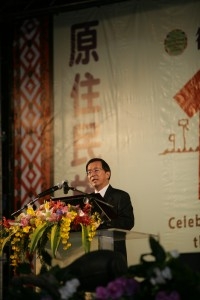President Chen Attends the 10th Anniversary Celebrations of the Council of Indigenous Peoples

It is a great honor to have been invited to join this celebration for the 10th anniversary of the founding of the Executive Yuan's Council of Indigenous Peoples. While wishing the Council a "happy birthday," I would like to say that I feel very gratified by the great strides that have been made in protecting the rights and safeguarding the status of indigenous peoples in Taiwan over the past decade.
While mayor of Taipei, I established the Indigenous Peoples Commission as a first-tier agency under the Taipei City Government, the first of its kind among the nation's city governments. Also during my tenure as Taipei mayor, I set up the Indigenous Peoples Park next to the National Palace Museum as a place where people may experience firsthand the wonders of indigenous cultures. I also renamed the avenue in front of the Presidential Office as Ketagalan Boulevard. For my inauguration as president, I invited the most prominent indigenous singer, A-Mei, to lead us in singing our national anthem. Moreover, Asia's first television station dedicated to broadcasting programs of interest to indigenous peoples, Indigenous TV, was launched in July of last year under my direction. These measures demonstrate that our government, out of respect for Taiwan's indigenous peoples, has committed itself to planning and implementing projects beneficial to their development.
The indigenous peoples have played an important role throughout Taiwan's history, as their culture has for Taiwanese culture. Ever since I first entered politics, it has been my conviction that Taiwan would be completely different without the indigenous peoples, and that if Taiwan is to stand up, the indigenous peoples must first rise.
During the presidential campaign in 1999, I contemplated how to map out comprehensive policies concerning Taiwan's indigenous people for the 21st century based on the three principles of safeguarding the indigenous peoples'dignity, protecting their rights, and promoting their development. It was these thoughts, which were later incorporated into the fundamental guidelines of the Democratic Progressive Party's White Paper on Indigenous Policy, that led me to sign a "New Partnership Agreement" with representatives of Taiwan's indigenous peoples on Orchid Island.
In October 2002, I reaffirmed that agreement in my capacity as the president, the first time that a sitting head of state had publicly proclaimed that the indigenous peoples are the original masters of Taiwan and that their natural sovereignty does exist and takes priority over that of the state.
Since then, the government has promoted indigenous autonomy, researched allowing indigenous legislators to represent their respective tribes instead of just the locations where they reside, signed treaties over land with the indigenous peoples, begun to use the indigenous names originally given to mountains and rivers, returned territory originally held by indigenous peoples to them, and restored to the indigenous their rights concerning the use of natural resources. Such actions have been taken in an attempt to fulfill our promises to the indigenous peoples.
Taiwan is a multi-ethnic nation where, during its long history as a destination of immigrants, it has been difficult to prevent the occasional occurrence of strife and conflict between different ethnic groups. But when we think about Taiwan's earliest masters, the indigenous peoples, and their attitude toward life, we feel deeply convinced that their reverence for nature, desire to protect the land, and respect for and acceptance of different cultures and ethnic groups, are virtues we may all appreciate. The people of this nation, including indigenous peoples, Holo Taiwanese, Hakka, mainlanders, and spouses from abroad, should all open their arms and hearts to embrace and work with each other for the prosperity of Taiwan, our home.
As we celebrate the 10th anniversary of the founding of the Council of Indigenous Peoples, I hope that, encouraged by the good wishes of Taiwan's people, the Council will continue to flourish and experience greater success in guiding this nation's indigenous peoples toward lasting prosperity. In closing, I would like to wish all our distinguished guests health, happiness, and great success. Thank you.